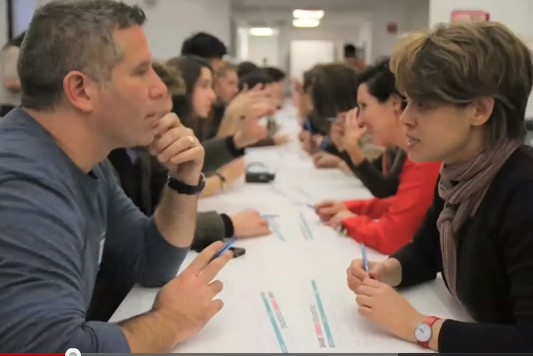Learning to "Share" for a More Cooperative Future
by Jennifer Prediger | December 1, 2011

How is the economy affecting your work?
That’s one of the questions asked at the start of SHARE New York, an event held in Manhattan hosted by Shareable.net and Parsons Desis Lab at The New School on the weekend of November 19 and 20, 2011, just two days after the two-month “anniversary” of the beginning of the #Occupy movement.
Freelancers, students, designers, artists, social entrepreneurs, and others came together to talk about turning economic disillusionment and rage into something more productive. Cooperation, social innovation, and how to use sharing to make life work were central themes of the weekend event, where participants traded skills, contacts, knowledge, information, and another way of being in the world.
I attended the conference expecting a chance to sit back and listen to luminaries of cooperation sharing best practices for collaboration. Featured collaborators delivered on their end. What I wasn’t expecting was how much attendees would be asked to share themselves over the course of the conference. More surprising was how resistant I would be to such an endeavor, at first. Thankfully, there were repeated opportunities to get over my inability to share--the first of which was a breakout session where participants talked about our biggest concerns and challenges along with the greatest opportunities and how we might make things better.
People within smaller groups opened up to share stories from the front lines of a troubled economy. People spoke of their personal struggles and collectively came up with solutions for how to tell the story of "what you are doing" with confidence and assuredness.
After much lively troubleshooting, a "sharing" lunch was set out on tables, with participants instructed to make a sandwich for someone they didn’t know--once again getting us out of our individual comfort zones and into bread, cheese, condiments, and conversation with others. Then we were asked to talk about positive and negative experiences we’d had sharing with those we were eating with. To my surprise, the group of four people I had lunch with all brought up stories from childhood where they were negatively affected by someone who didn’t know how to share, causing them to be less inclined to share. The lunch seemed to ameliorate these past difficulties, and the conference carried on with what felt like even greater sharing capacity.
This feeling was reinforced by Shareable Magazine Co-Founder Neal Gorenflo, who moderated the next conversation entitled ‘Pioneering a New Economy.’ This panel discussion looked at shifting to new economic models. “Sharing increases your capacity to give,” said Gorenflo. He shared his own journey toward a new economic model, which started with a monthly salon he started in the San Francisco Bay Area called The Abundance League. Through these meetings, Neal and others in the salon discovered that people helping each other could create more wealth--a wealth that is about more than just money, but about having a network of people who are able to help each other achieve their dreams.
That said, money wasn’t ruled out as a viable means of existence in new economic models. Cooperative endeavors can make money too. “We are very much in a capitalist enterprise,” said Ann Herpel, General Coordinator of the Park Slope Food Co-op. “We make a living. We help 67 people make a decent living. Jobs that pay us well, that give us health insurance. We too have a very viable economic model.”
Another concept that surfaced was bartering outside of the economic model. “It’s more important to have access to goods than to own goods,” said Caroline Woolard, Co-Founder of OurGoods and Trade School. Woolard noted that 2012 is fittingly the United Nations "Year of Cooperation." And that idea translates to services too. A participant from eastern Pennsylvania shared stories of her local time bank and how she traded PR services for chiropractics.
Tal Beery, a panelist who is a co-founder of the Orev House, a collaborative live/work arrangement, said that collectively his group would ask, “Is this better for me than it would be if I were on my own?” This question served as a guiding force for how members thought about their collective experience and why they stayed with it. Beery spoke of more fun, quality of life, and saving money as just a few of the benefits of this shared endeavor. “Part of why sharing makes so much sense is you save a lot of money. You become more financially efficient,” said Beery.
Of all the lessons taken away from the weekend, the main one was that the solidarity economy or sharing economy may be just what we need to make it in an increasingly difficult economic times. More is possible together than could ever be possible alone.
Big ideas to take home:
- The best investment you can make in yourself is to invest in your community
- Sharing increases your capacity to give
- Don’t be afraid to trade
- Part of why sharing makes so much sense is you save a lot of money. You become more financially efficient.
- Cooperatives can be a very viable economic model
- It's more important to have access to goods than to own goods
To learn more, watch this video featuring SHARE New York’s organizers, including Neal Gorenflo, co-founder of Shareable Magazine, Milicent Johnson, Shareable Magazine’s community builder, and Cameron Tonkinwise, Ph.D and Chair of Design Thinking and Sustainability at Parsons, the New School of Design.
To read more about the weekend’s events, check out the recap on Shareable.net

